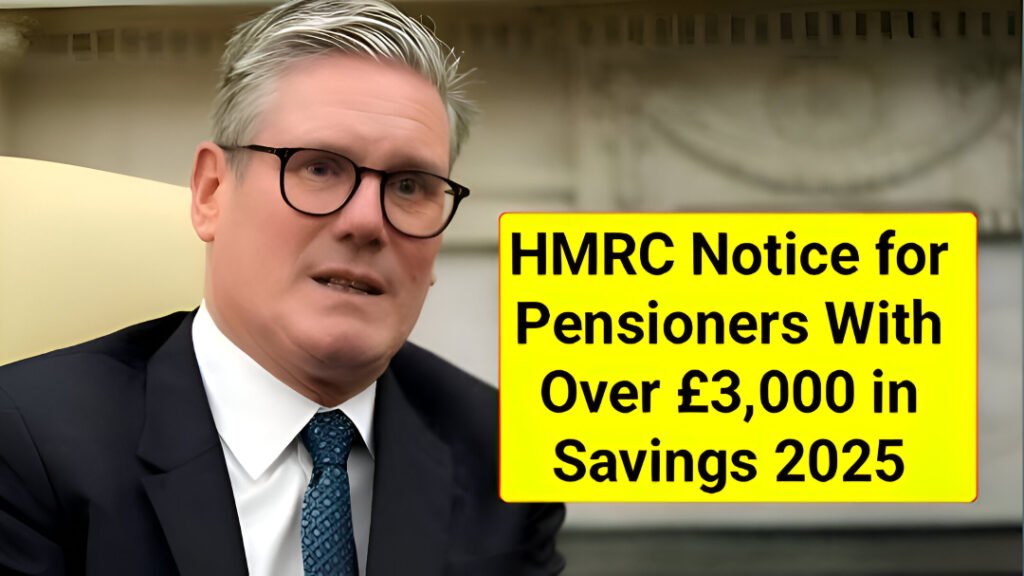HMRC Notices for UK Pensioners Savings 2025: Across the UK, many pensioners are receiving official letters from HMRC regarding their savings and interest income. These notices are particularly relevant for individuals with over £3,000 in savings, as even modest amounts of interest can trigger tax checks. While the letters may appear confusing or concerning, their purpose is to ensure that pensioners are paying the right amount of tax on both their pensions and savings income. Understanding why these notices arrive, and how to respond, is essential for financial peace of mind during retirement.
Why HMRC Targets Pensioners With Savings
Pensioners are increasingly under HMRC’s radar because more retirees are holding savings in banks, building societies, and investment accounts. With rising interest rates, even small deposits can generate taxable income that may exceed the personal savings allowance. HMRC notices are therefore sent to pensioners with savings above £3,000 to double-check whether their total income from pensions and interest is properly taxed. This ensures fairness in the tax system and prevents underreporting of income.
The Importance of the £3,000 Savings Threshold
The £3,000 figure is not a direct tax limit, but rather a practical marker HMRC uses when monitoring pensioners’ finances. The real issue is the interest generated from savings, which can affect whether pensioners owe additional tax. For example, someone with £3,000 saved in a high-interest account could see their annual earnings from interest push them above the personal savings allowance. At that point, HMRC steps in with notices to clarify the pensioner’s tax position and adjust codes if needed.
How HMRC Tracks Pensioners’ Income and Savings
Many pensioners wonder how HMRC knows about their savings accounts. The answer lies in data-sharing agreements. Each year, banks, building societies, and other financial institutions automatically report interest earnings to HMRC. If this interest appears to exceed allowances, HMRC issues notices or updates tax codes. For pensioners with over £3,000 in savings, this automatic reporting system is the main reason they may suddenly receive letters, even if they believed their finances were straightforward.
Impact of Savings on Pensions and Benefits
Savings income does not replace pension income—it adds to it. For pensioners receiving the full State Pension plus private or workplace pensions, even modest savings interest can push total income above the tax-free threshold. This has a knock-on effect not only on income tax but also on certain benefits like Pension Credit or Housing Benefit, which are means-tested. HMRC notices therefore serve as an important reminder that savings income must be considered alongside pensions when calculating overall entitlements.
Tax Codes and HMRC Notices Explained
One of the most common reasons for HMRC notices is a change in tax codes. If HMRC believes pensioners are earning taxable interest from savings, they will adjust PAYE codes to collect the right tax directly from pension payments. This prevents large unexpected bills at the end of the year. Pensioners should carefully review updated codes to make sure they accurately reflect savings income. If there is an error, contacting HMRC promptly can correct the issue and avoid overpayment.
Do Pensioners Need to File Self Assessment?
Not every pensioner with savings needs to complete a Self Assessment return. HMRC generally adjusts tax codes for modest savings income. However, if savings or investment income exceeds £10,000 annually, Self Assessment becomes mandatory. For most pensioners with over £3,000 in savings, a full return won’t be necessary, but HMRC notices may still arrive to confirm interest amounts. Understanding when a Self Assessment is required helps pensioners avoid both penalties and unnecessary paperwork.
Penalties for Ignoring HMRC Notices
Failing to respond to HMRC notices or neglecting to declare taxable savings income can lead to penalties. These may include fines, interest charges, and in serious cases, additional assessments for past years. HMRC distinguishes between accidental mistakes and deliberate avoidance, with higher penalties for the latter. For pensioners, responding quickly and honestly to notices ensures compliance and avoids unnecessary financial stress during retirement.
Ways Pensioners Can Reduce Tax on Savings
There are several strategies for pensioners to minimise or avoid tax on savings income. Using ISAs allows tax-free interest, regardless of the amount saved. Couples can make use of the Marriage Allowance to transfer unused personal allowances. Pensioners can also spread savings across accounts to stay within allowances. By planning wisely, many pensioners with over £3,000 in savings can legally reduce or eliminate their tax liabilities and avoid frequent HMRC notices.
Digital Services and Professional Advice
HMRC now offers online tools that allow pensioners to check tax codes, report savings income, and respond to notices through their Personal Tax Account. This digital service makes it easier to correct errors and stay updated in real time. For pensioners with complex financial situations, professional tax advice can also be valuable. Advisers help ensure compliance, maximise allowances, and reduce the risk of errors that could trigger HMRC notices or penalties.
Conclusion
For pensioners in the UK with over £3,000 in savings, HMRC notices are simply part of the system designed to keep taxation fair and accurate. These letters are not necessarily warnings of wrongdoing, but reminders to check income, review tax codes, and confirm interest amounts. By understanding how savings interact with pensions, using tax-efficient accounts, and responding promptly to HMRC communications, pensioners can safeguard their retirement income and enjoy peace of mind knowing they are fully compliant.
